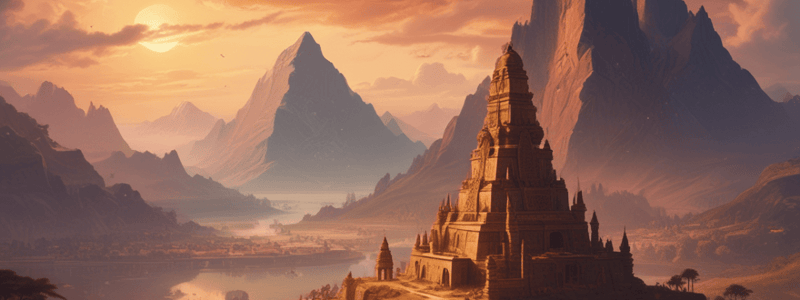Podcast
Questions and Answers
Which ancient civilization is credited with the invention of writing?
Which ancient civilization is credited with the invention of writing?
- Ancient Greece
- Ancient Rome
- Ancient Egypt
- Mesopotamia (correct)
What was the primary focus of the Enlightenment era?
What was the primary focus of the Enlightenment era?
- The emphasis on reason and individualism (correct)
- The exploration and colonization of the Americas
- The rise of nation-states and imperialism
- The revival of classical culture and art
What is the term for the process of independence and self-determination for colonized nations?
What is the term for the process of independence and self-determination for colonized nations?
- Decolonization and National Liberation (correct)
- Digital Age
- Globalization
- Social and Cultural Movements
Flashcards are hidden until you start studying
Study Notes
Ancient Civilizations
- Mesopotamia (3500 BCE): First urban civilization, invention of writing (cuneiform), and development of cities (e.g., Babylon)
- Ancient Egypt (3100 BCE): Pyramids, mummies, hieroglyphics, and pharaohs (e.g., Ramses II)
- Ancient Greece (8th century BCE): City-states (e.g., Athens, Sparta), philosophers (e.g., Socrates, Plato), and theater (e.g., Sophocles)
- Ancient Rome (8th century BCE): Republic, empire, and legacy (e.g., law, architecture, language)
Middle Ages
- Fall of the Roman Empire (5th century CE): Decline and fragmentation of the Roman Empire
- Rise of Christianity: Spread of Christianity throughout Europe, establishment of the Catholic Church
- Feudalism: System of lords, vassals, and serfs in medieval Europe
- Crusades (11th-13th centuries): Series of religious wars between Christians and Muslims
Early Modern Period
- Renaissance (14th-17th centuries): Revival of classical culture, art, and science in Europe
- Age of Exploration (15th-17th centuries): European discovery and colonization of the Americas and other regions
- Reformation (16th century): Protestant movement against the Catholic Church, led by figures like Martin Luther
- Enlightenment (17th-18th centuries): Era of intellectual and scientific progress, emphasizing reason and individualism
Modern Era
- Industrial Revolution (18th-19th centuries): Transformation of economy and society through industrialization and urbanization
- Nationalism and Imperialism (19th-20th centuries): Rise of nation-states and European empires, leading to conflicts and rivalries
- World War I (1914-1918): Global conflict sparked by the assassination of Archduke Franz Ferdinand
- World War II (1939-1945): Global conflict against Nazi Germany, Fascist Italy, and Imperial Japan
- Cold War (1945-1991): Ideological and geopolitical rivalry between the United States and the Soviet Union
Contemporary Era
- Globalization: Increasing interconnectedness and interdependence of economies and cultures worldwide
- Decolonization and National Liberation: Process of independence and self-determination for colonized nations
- Social and Cultural Movements: Various movements advocating for human rights, equality, and justice (e.g., civil rights, feminism, environmentalism)
- Digital Age: Rapid development and proliferation of digital technologies, transforming modern society and culture
Ancient Civilizations
- Mesopotamia emerged as the first urban civilization around 3500 BCE, marked by the invention of writing (cuneiform) and development of cities like Babylon.
- Ancient Egypt flourished from 3100 BCE, characterized by the construction of pyramids, mummification practices, and the use of hieroglyphics, with notable pharaohs like Ramses II.
- Ancient Greece comprised city-states like Athens and Sparta, and was home to influential philosophers like Socrates and Plato, as well as the development of theater, as seen in the works of Sophocles, from the 8th century BCE.
- Ancient Rome rose to prominence from the 8th century BCE, leaving a lasting legacy in law, architecture, and language, and was marked by the transition from a republic to an empire.
Middle Ages
- The Roman Empire declined and fragmented in the 5th century CE, leading to a period of instability.
- Christianity spread throughout Europe, establishing the Catholic Church as a dominant force.
- The feudal system emerged in medieval Europe, characterized by a hierarchical structure of lords, vassals, and serfs.
- The Crusades, a series of religious wars between Christians and Muslims, took place from the 11th to the 13th centuries.
Early Modern Period
- The Renaissance, spanning from the 14th to the 17th centuries, saw a revival of classical culture, art, and science in Europe.
- The Age of Exploration, from the 15th to the 17th centuries, was marked by European discovery and colonization of the Americas and other regions.
- The Reformation, led by figures like Martin Luther, challenged the Catholic Church in the 16th century, giving rise to Protestantism.
- The Enlightenment, from the 17th to the 18th centuries, emphasized reason and individualism, marking an era of intellectual and scientific progress.
Modern Era
- The Industrial Revolution, from the 18th to the 19th centuries, transformed the economy and society through industrialization and urbanization.
- Nationalism and Imperialism, from the 19th to the 20th centuries, led to the rise of nation-states and European empires, resulting in conflicts and rivalries.
- World War I, from 1914 to 1918, was a global conflict sparked by the assassination of Archduke Franz Ferdinand.
- World War II, from 1939 to 1945, was a global conflict against Nazi Germany, Fascist Italy, and Imperial Japan.
- The Cold War, from 1945 to 1991, was an ideological and geopolitical rivalry between the United States and the Soviet Union.
Contemporary Era
- Globalization has led to increasing interconnectedness and interdependence of economies and cultures worldwide.
- Decolonization and National Liberation have enabled colonized nations to gain independence and self-determination.
- Various social and cultural movements, such as civil rights, feminism, and environmentalism, have advocated for human rights, equality, and justice.
- The Digital Age has seen the rapid development and proliferation of digital technologies, transforming modern society and culture.
Studying That Suits You
Use AI to generate personalized quizzes and flashcards to suit your learning preferences.




